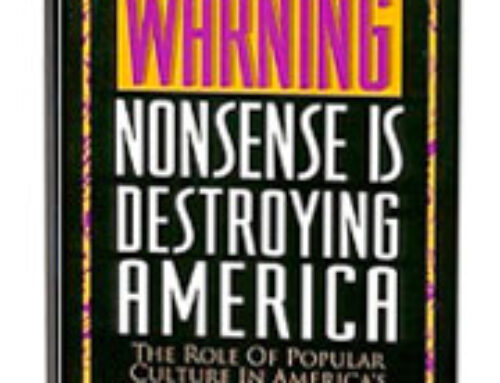 Many people are asking what has happened to our country. The question is occasioned both by the growing number of problems facing us—including terrorism, racial unrest, governmental profligacy, political intransigence, and educational decline—and by our diminishing ability to solve these problems.
Many people are asking what has happened to our country. The question is occasioned both by the growing number of problems facing us—including terrorism, racial unrest, governmental profligacy, political intransigence, and educational decline—and by our diminishing ability to solve these problems.
I believe the best answer to the question is, “Relativism happened.” That is, truth is no longer considered objective and discovered, but instead subjective and created to fit our individual wishes and assumptions.
Relativism is not new. It had long been advanced in the theoretical musings and deliberations of intellectuals. What is new is that over the last half-century it escaped the ivory tower and became popular, thanks to the mass media. Accordingly, it has changed millions of people in unfortunate ways, notably the following:
Relativism has undermined curiosity and the desire to learn. Its claim that no subject is more important than any other diminishes the importance of traditional subjects such as history, science, and math and makes it acceptable to be ignorant about every subject.
Relativism has encouraged slothful teaching. If no subject is more important than any other, then the content of courses doesn’t matter. A course in Justin Bieber’s philosophy is as valid as one in Plato’s or Aristotle’s. Moreover, if teachers replace the subject matter they were hired to teach with their personal opinions about politics, sex, or with stories about their pets, that is also acceptable.
Relativism has corrupted journalism. If everyone creates his or her own truth, then there is no such thing as error, opinion is synonymous with fact (and even wisdom), and intellectual humility has no value. Thus journalists are emboldened to cast aside objectivity, report their personal views rather than the facts, and ignore any story that doesn’t flatter their perspective. As a result, the public is denied the knowledge necessary for them to make informed decisions.
Relativism has made reason, logic, and common sense passé. If truth is created rather than discovered, anyone can hold any view on the sole basis of “it’s my opinion.” Evidence is therefore unnecessary, and comparing viewpoints to determine which is more insightful is anti-democratic. Furthermore, analysis and criticism of one’s own views undermines self-esteem.
Relativism has undermined public discourse. If truth is subjective, then there is no point in listening to what other people say, especially those who hold a different view from one’s own. People who believe this have the attitude “I have my truth, so other people’s views are irrelevant to me,” which prevents them from engaging in meaningful discourse. As a result, much that passes for debate on TV talk shows—as well as in government—is serial monologue, with mouths open and ears shut. (This explains why compromise is so rare in contemporary politics.)
Relativism has suppressed conscience. Conscience is nurtured by asking ourselves probing questions: How fair am I to others? How respectful and kind? Do I meet my responsibilities faithfully? Am I truthful? Honest? Dependable? and so on. Relativism, in contrast, claims that to be virtuous we need only believe ourselves to be so. It therefore shifts our focus from self-improvement to self-esteem. (This explains why so many people are rude, uncivil, and disrespectful of others with little awareness of their offenses.)
Each of these developments has compromised our ability to solve our nation’s problems. Once a society loses that ability, British historian Arnold Toynbee has noted, it is on the path to destruction. To avoid that fate, America must return to a more responsible view of truth and reality.
Copyright © 2015 by Vincent Ryan Ruggiero. All rights reserved

